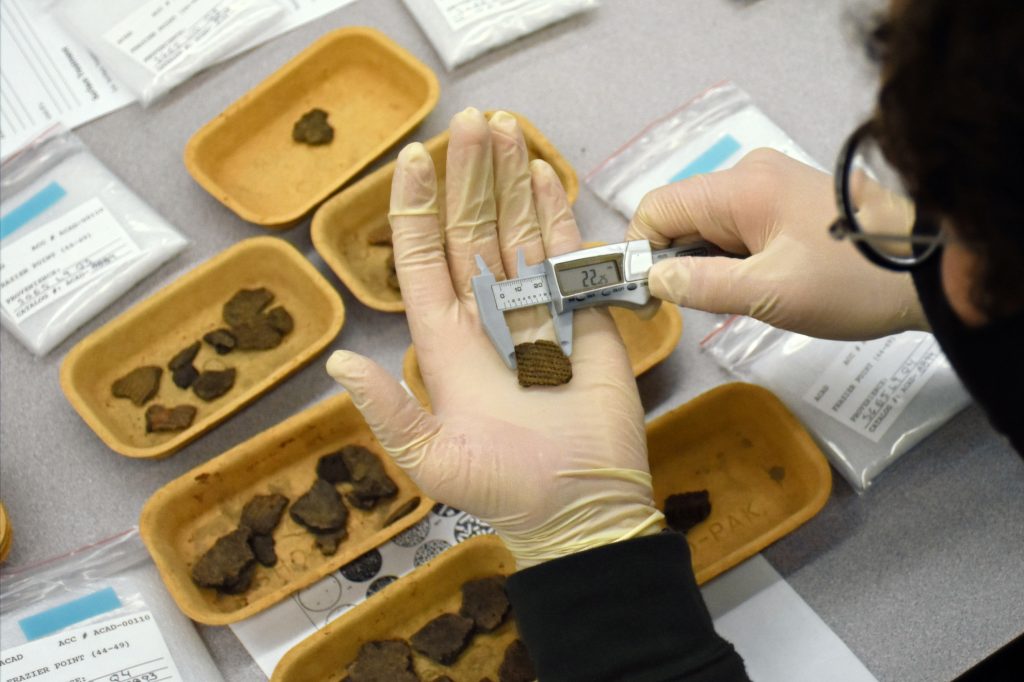Research and Resources

Our research spans the breadth of human presence in the Wabanaki Homeland (Maine and
Canadian Maritimes), from the first evidence of human occupation, through times of cultural contact, and up to present-day engagement with cultural landscapes.
Much of our research aims to co-create knowledge through collaborations with the Wabanaki Nations (Maliseet, Mi’kmaq, Passamaquoddy, and Penobscot). Our lab is outfitted with equipment and resources that aid in the analysis, interpretation, documentation, and reporting on human and environmental pasts.
Affiliations
The Northeast Archaeology Laboratory is an affiliate of the Northeast Hub for the Center for Braiding Indigenous Knowledges and Science (CBIKS) at the University of Massachusetts Amherst, established in 2023 with support from the National Science Foundation Science and Technology Center program.
We have a long-standing collaborative partnership with the National Park Service to research, steward and monitor archaeological sites in Acadia National Park.
We also support the Maine Midden Minders citizen science program through community
outreach, coastal site erosion monitoring, and stewardship of heritage places along the coast of Maine.
Publications
Mann, Abby E., “Dietary Change Among Canis Familiaris During the Late Ceramic Period on the Maine-Maritime Peninsula: A Case Study From the Holmes Point West Site (ME 62-8), Machias Bay, Maine” (2021). Electronic Theses and Dissertations. 3401. https://digitalcommons.library.umaine.edu/etd/3401
Mychajliw, Alexis M., Audrey Y. Hsi, Drew An-Pham, Olivia L. Olson, Nanny Carder, John G. Crock, and Francis “Jess” W. Robinson. 2023. “Zooarchaeological Assemblages Contextualize the Historical Ecology and Harvest of Fur-Bearing Mammals in Vermont.” Frontiers in Ecology and Evolution 11. https://doi.org/10.3389/fevo.2023.1065567
Newsom, Bonnie, Donald Soctomah, Emily Blackwood, and Jason Brough. “Indigenous Archaeologies, Shell Heaps, and Climate Change: A Case Study from Passamaquoddy Homeland.” Advances in Archaeological Practice 11, no. 3 (2023): 302-13. doi:10.1017/aap.2023.14. https://doi.org/10.1017/aap.2023.14
Newsom, Bonnie D. and Matthew James. 2019. “Beyond Grit and Shell: Evidence of Conifer Needle Temper in Archaeological Ceramics from Maine.” Archaeology of Eastern North America 47: 135-155. https://www.jstor.org/stable/26816286
Newsom, Bonnie, Natalie Dana Lolar, and Isaac St. John. 2021. “In Conversation with the Ancestors: Indigenizing Archaeological Narratives at Acadia National Park, Maine” Genealogy 5, no. 4: 96. https://doi.org/10.3390/genealogy5040096 https://www.mdpi.com/1342756
Olson, Olivia. 2023. “The Sad Tale of Maine’s Extinct Sea Mink” Maine Boats, Homes & Harbors Magazine. https://maineboats.com/print/issue-185/sad-tale-maine%E2%80%99s-extinct-sea-mink
Olson, Olivia. 2022. “Sea Minks (Neovison macrodon) in Context: Ecology, Phylogeny, and Extinction” [Unpublished undergraduate thesis]. Middlebury College.
Olson, Olivia. 2022-Present. Editor, Conservation Paleobiology Network Newsletter.
Olson, Olivia. 2021. “Sea Mink Stories: Parts 1-4” https://communities.springernature.com/users/olivia-olson
Reeder-Myers, L.A., T.J. Braje, C.A. Hofman, E.A. Elliott Smith, C. Garland, M. Grone, C.S. Hadden, M. Hatch, T. Hunt, A. Kelley, M.J. LeFebvre, M. Lockman, I. McKechnie, I.J. McNiven, B. Newsom, T. Pluckhahn, G. Sanchez, M. Schwadron, K. Smith, T. Smith, A. Spiess, G. Tayac, V.D. Thompson, T. Vollman, E.M. Weitzel, and T.C. Rick. 2022. Indigenous oyster fisheries persisted for millennia and should inform future management. Nature Communications, 13(1), pp.1-13.. https://www.ncbi.nlm.nih.gov/pmc/articles/PMC9065011/
Back to Northeast Archaeology Lab
Back to Anthropology Laboratories
Make an Impact – Support UMaine’s
Northeast Archaeology Program
Your gift to the Northeast Archaeology Lab will impact the preservation and understanding of Northeast archaeology. You can help to advance groundbreaking collaborative research with the Wabanaki Nations, ethical stewardship of cultural heritage, meaningful community engagement and partnerships, and the education of future generations. Your gift will help the Northeast Archaeology lab become a regional leader! Click the link below to donate today. Thank you for your support!
